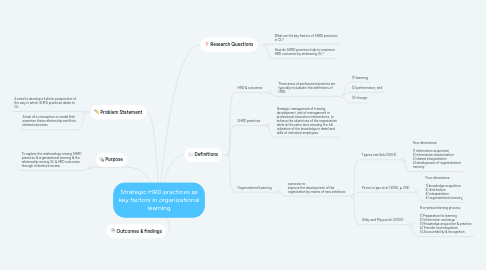
1. Purpose
1.1. To explore the relationships among SHRD practices & organizational learning & the relationship among OL & HRD outcomes through a literature review
2. Problem Statement
2.1. A need to develop a holistic perspective of the way in which SHRD practices relate to OL
2.2. A lack of a conception or model that examines these relationship and their related outcomes
3. Research Questions
3.1. What are the key factors of SHRD practices in OL?
3.2. How do SHRD practices help to maximize HRD outcomes by embracing OL?
4. Definitions
4.1. HRD & outcomes
4.1.1. Three areas of professional practice are typically included in the definitions of HRD:
4.1.1.1. (1) learning;
4.1.1.2. (2) performance; and
4.1.1.3. (3) change
4.2. SHRD practices
4.2.1. Strategic management of training, development, and of management or professional education interventions, to achieve the objectives of the organization while at the same time ensuring the full utilization of the knowledge in detail and skills of individual employees
4.3. Organizational Learning
4.3.1. a process to improve the development of the organization by means of new initiatives
4.3.1.1. Tippins and Sohi (2003)
4.3.1.1.1. Four dimensions: 1) information acquisition, 2) information dissemination 3) shared interpretation 4) development of organizational memory
4.3.1.2. Pe´rez Lo´pez et al. (2006, p. 218)
4.3.1.2.1. Four dimensions: 1) knowledge acquisition 2) distribution 3) interpretation 4) organizational memory,
4.3.1.3. Gilley and Maycunich (2000)
4.3.1.3.1. Five-phase learning process: 1) Preparation for learning 2) Information exchange 3) Knowledge acquisition & practice 4) Transfer and integration 5) Accountability & recognition
